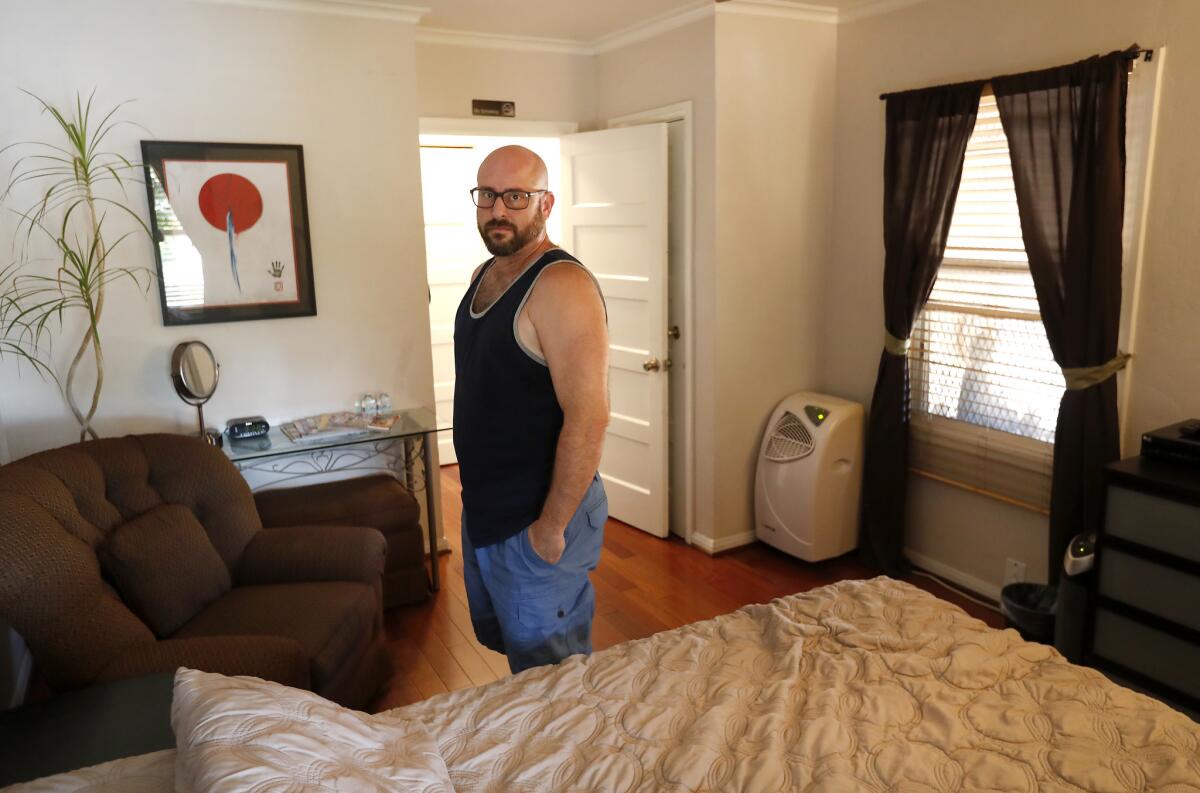More L.A. homes could be rented out on Airbnb. Tenant activists aren’t happy

- Share via
Los Angeles could loosen one of the key restrictions in its new rules clamping down on Airbnb-type rentals, allowing people to host travelers in some units covered by the Rent Stabilization Ordinance.
The Rent Stabilization Ordinance, which applies chiefly to older apartments in L.A., limits rent hikes annually for tenants. The City Council voted last year to ban such units from being offered up for short stays, part of a broader set of restrictions on short-term rentals. The rules formally went into effect in July, but the city said it would hold off on enforcing them until November.
Now L.A. leaders could ease some of those restrictions — an idea that has heartened some hosts but alarmed tenant advocates who fear it could create a loophole for landlords to exploit.
Under a proposal that received tentative approval Wednesday, Angelenos would be able to rent out a home for short stays, even if it is rent stabilized, as long as it is a unit that they own and occupy.
The City Council voted 14-0 Wednesday after a short discussion to back the recommended changes and ask the city attorney to draft an ordinance to put them into effect.
L.A. was already poised to allow people to rent out their own “primary residence” for short stays, but not if it was covered by the Rent Stabilization Ordinance. That had drawn protests from some rental hosts, who argued that they should be able to rent their homes to travelers on platforms like Airbnb and VRBO, just like other residents and homeowners in L.A.
The revised rules would not allow absolutely everyone who lives in a rent-stabilized unit to host such rentals: Only people who both own and occupy their unit would be eligible, according to the proposal.
The idea was championed by several council members, including Councilman Bob Blumenfield, whose spokesman Jake Flynn said it was meant to help people rent out their own homes for short stays while protecting apartment buildings from being turned over entirely to travelers. Councilman Mitch O’Farrell said it would “help mom-and-pop property owners survive.”
Marc Bochner, who owns a rent-stabilized triplex and lives in one of the units, said the proposed exemption would allow him to continue offering up a spare bedroom in his own apartment to travelers, providing needed income to cover his mortgage.
“I understand the pressure they have to address the affordable housing crisis ... but telling us we can’t host in our own apartments?” Bochner said. If the city doesn’t loosen the rules, “many of us will lose our properties.”
The exemption would also ensure that people who live in an older home and built a granny flat on their property would be eligible to host short-term rentals in their main home. Under L.A. rules, building a second unit on a property can mean, in some cases, that the main home is covered by the Rent Stabilization Ordinance -- a scenario that surprised homeowners and council members.
Tenant activists and others worried about how short-term rentals affect the housing market have been opposed to loosening the restrictions, warning that corporate owners may try to game the rules to convert needed housing into “rogue hotels.”
Judith Goldman, co-founder of the advocacy group Keep Neighborhoods First, said changing the rules opens a “gigantic loophole.”
For instance, Cynthia Strathmann, executive director of the nonprofit Strategic Actions for a Just Economy, argued that someone who owns an apartment building and lives out of town could falsely claim to live in one of the apartments in their building, then rent it out constantly to travelers.
“We haven’t even seen if the ordinance works yet,” Strathmann said. “Why don’t we see how it works before we start creating potential loopholes?”
Ahead of the Wednesday vote, Councilwoman Monica Rodriguez asked for city staffers to report back soon on how the rules would be enforced to make sure the unit was truly “owner occupied.”
The decision is not final: The proposed ordinance must be drafted by city lawyers and will come back to the council for final approval.
More to Read
Sign up for Essential California
The most important California stories and recommendations in your inbox every morning.
You may occasionally receive promotional content from the Los Angeles Times.











